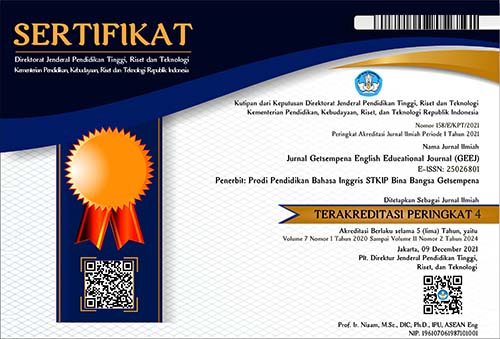THE USE OF NUMBER HEADS TOGETHER (NHT) IN TEACHING SPEAKING FOR JUNIOR HIGH SCHOOL
Abstract
This research is about the use of Number Head Together (NHT) in Teaching Speaking for Junior High School. The research problem for the study are (1) How is the use of Number Heads Together in Teaching at Junior High School, (2) What are the teacher obstacles during the use of Number Heads Together (NHT) in teaching speaking for Junior High School. The objective of the study are: (1) to figure out the use of Number Heads Together (NHT) in teaching speaking for Junior High School, (2) To find out the teacher obstacles during the use of Number Heads Together (NHT) in Teaching Speaing for Junior High School. In order to get the data, the resercher used observation sheet and Interview Guide. This research took place in SMP Muhammadiyah 1 Banda Aceh. Through the research, it was found that; (1) the use of Number Heads Together (NHT) in teaching speaking follow the steps they are, greeting, reviewing, explaining, numbering, questioning, discussing, answering. (2). There are some obstacles that the teacher faced during the use of Number Heads Together (NHT) they are: the difficulties in making the group which consist of various proficiency and the lack of students trust to the member of the groups answers.
References
Brown, H. D. 2000. Principles of Language Learning and Teaching. New York: Addison Wesley Longman, Inc.
Cruickshank, D.R., Jenkins, D.R., Metclaf, K.K (2006). The Act of Teaching 4th Analysis and Application. New Jersey: Merrill Prentice Hall.
Dewi, S. (2010). The Implementation of Sharing Time Technique in Speaking Class. Thesis (Unpublished). Banda Aceh: Universitas Syiah Kuala.
Fauziati, E. (2002). Teaching of English As a Foreign Language, (Surakarta: Muhammadiyah University Press.
Hamdani. (2009). The Implementation of Teaching Speaking. Thesis (Unpublished). Banda Aceh, Universitas Syiah Kuala.
Harmer, J. (2001).The Practice of English Language Teaching. London: Pearson Education Ltd.
Hornby, A. S. (2009). Oxford Advanced Learner’s Dictionary. Oxford: Oxford University Press.
Jacobs, G. M., Power, M. A., Loh, W. I. (2002). The teacher’s sourcebook for cooperative learning: Practical techniques, basic principles, and frequently asked question. Thousand Oaks, CA: Corwin Press.
Johnson, D. W., & Johnson, R. T. (2000). Learning Together and Alone (5th ed). Boston: Allyn & Bacon.
Kagan, S. 2002. Cooperative Learning. New York: Prentice Hall.
Mishaferi, E. (2011), Teaching Vocabulary through words map. Banda Aceh,: unpublished
Nilasanti, H. (2008) Gender Differences in Term of Speaking Ability. Skripsi (Unpublished). Banda Aceh: Universitas Syiah Kuala
Richards, J.C., & Rodgers, T.S. (2001). Apporaches and Methods in Language Teaching. New York: Cambridge University Press.
Slavin, R.E. (2004). A Practical Guide to Cooperative Learning. Massachussetss: Allyin and Bacon Publisher.
Syakur. (2000). Language Testing and Evaluation. Surakarta. Sebelas Maret University Press.
Trianto, B. (2009). Model PembelajaranInovatif-ProgresifKonsep, Strategi dan Implementasinya Dalam Kurikulum Tingkat Satuan Pendidikan (KTSP). Jakarta: Gramedia Widiarsana Indonesia.
Vicars.(2011). Linguistics and Non Linguistics Factors in Teaching and Learning Speaking. New Yok: Press Syndicate.

























